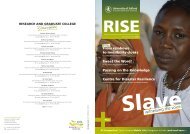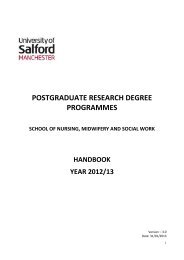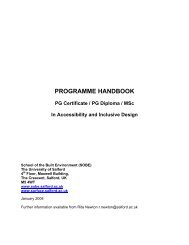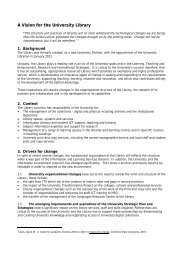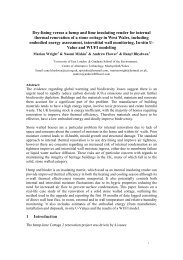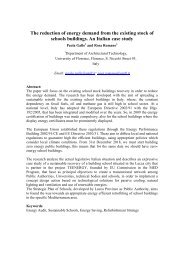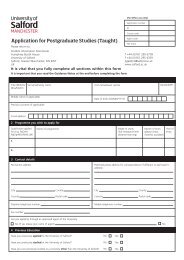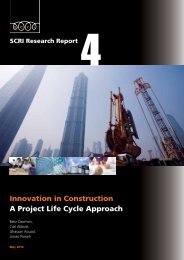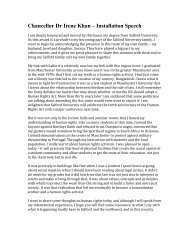RISE May-June 2009 - University of Salford
RISE May-June 2009 - University of Salford
RISE May-June 2009 - University of Salford
Create successful ePaper yourself
Turn your PDF publications into a flip-book with our unique Google optimized e-Paper software.
<strong>RISE</strong>! Research Innovation and Internationalisation News<br />
DARWIN’S DECLINE<br />
As Charles Darwin’s 200th birthday approaches, new research<br />
from the <strong>University</strong> <strong>of</strong> <strong>Salford</strong> has identified a decline in<br />
references to the pioneering scientist in ‘A’ level textbooks -<br />
despite the continuing presence <strong>of</strong> creationist theory.<br />
Dr Paul Rees, a lecturer in biology and former ‘A’ level teacher,<br />
examined textbooks and syllabuses used in the UK since the sixties, and<br />
found that textbooks currently in use sometimes completely fail to<br />
mention Darwin, and <strong>of</strong>ten only deal very sketchily with the theory <strong>of</strong><br />
evolution. On the other hand, creationism gets several references in<br />
current textbooks, including Hall et al 2006 which says the idea that all<br />
living things are descended from a common ancestor is a minority view<br />
among the people <strong>of</strong> the world.<br />
CH<br />
SNESS<br />
SYSTEM DYNAMICS<br />
SOCIETY<br />
Dr Rees <strong>of</strong> the Research Institute for the Built & Human Environment,<br />
said: “While the historical context <strong>of</strong> important theories, and the names<br />
<strong>of</strong> their proponents, are commonplace in textbooks written for some<br />
other subjects, such as psychology, in biology textbooks Darwin is<br />
sometimes not deemed important enough to mention. “If people are<br />
giving space to nonsense like creationism, then they should certainly be<br />
mentioning the most important figure in our understanding <strong>of</strong> the<br />
natural world. Role models and icons are important to help young<br />
people become inspired by science. It’s a shame that biology examiners<br />
and therefore textbooks don’t always recognise this.”<br />
If you would like more information on Dr. Rees’ work please contact<br />
him at: p.a.rees@salford.ac.uk<br />
Pr<strong>of</strong>essor Brian Dangerfield, Pr<strong>of</strong>essor <strong>of</strong> Systems Modelling,<br />
<strong>Salford</strong> Business School, has recently been appointed as<br />
President <strong>of</strong> the UK Chapter <strong>of</strong> the System Dynamics Society<br />
for <strong>2009</strong>.<br />
The International System Dynamics Society has 16 national Chapters<br />
and one Student Chapter (see www.systemdynamics.org). The UK<br />
Chapter has the largest membership excluding the USA. The UK<br />
Chapter hosts an annual conference in February and a number <strong>of</strong><br />
networking meetings during the year in the evening. It is hoped to<br />
convene one <strong>of</strong> these evening events in the North-West in <strong>May</strong> or <strong>June</strong>.<br />
The annual conference now includes a PhD symposium which allows<br />
doctoral students to present their work in poster form and receive<br />
feedback from experts (mainly academics but also from those who work<br />
in the consultancy sector).<br />
The UK Chapter <strong>of</strong>fers two prizes annually: The Steer Davis Gleave Prize<br />
for the best piece <strong>of</strong> work which applies the system dynamics<br />
methodology to a significant problem <strong>of</strong> wide public interest in the UK<br />
and a Student Prize for the best student project report using system<br />
dynamics.<br />
To find out more about the System Dynamics Society please contact<br />
Brian at: b.c.dangerfield@salford.ac.uk<br />
15




